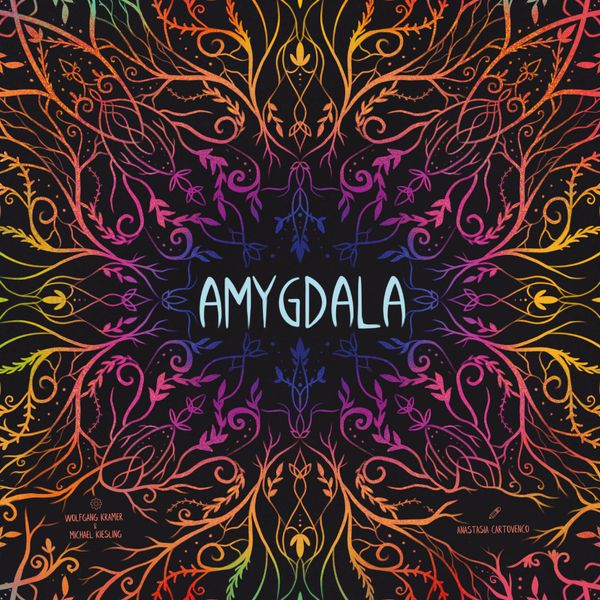Amygdala (2023) Board Game
Brief History and Background Information for Amygdala
Amygdala is an abstract strategy board game designed by renowned designers Michael Kiesling and Wolfgang Kramer. It was published by Game Brewer in 2023 and has quickly gained popularity among board game enthusiasts. The game features intricate gameplay mechanics and beautiful artwork by Anastasia Cartovenco.
Game Components of Amygdala
- Game board
- Player tokens
- Influence markers
- Pattern tiles
- Set collection cards
How To Setup Amygdala
- Place the game board in the center of the table.
- Give each player their colored tokens and influence markers.
- Shuffle the pattern tiles and set collection cards.
- Place the tiles and cards in their designated areas on the board.
Gameplay Mechanics and Game Objective
In Amygdala, players compete to control areas on the board by strategically placing their tokens and influence markers. Players must also collect sets of cards to earn points. The game combines elements of area majority/influence, pattern building, set collection, and tile placement. The objective is to have the most influence in key areas and collect the most points to win the game.
Player Experience
Pros
- Engaging gameplay that requires strategic thinking
- Beautiful artwork and components
- Variety of mechanics keeps the game interesting
Cons
- Learning curve may be steep for beginners
- Luck can play a role in determining the winner
Personal Thoughts on Amygdala
Amygdala offers a unique and challenging gameplay experience that will appeal to fans of abstract strategy games. The combination of different mechanics keeps the game fresh and engaging, but the learning curve may be a deterrent for some players. The build quality of the game is excellent, and the artwork adds to the immersive experience. The pricing may be on the higher side, but the game’s availability in both new and used markets makes it accessible to a wider audience. Players who enjoy complex strategy games should definitely give Amygdala a try, while those looking for a more casual experience may want to skip it. Overall, Amygdala is worth your time if you enjoy a good brain-teasing challenge.
Game Components of Amygdala
How To Setup Amygdala
To set up Amygdala, players start by placing the main game board in the center. Each player receives a player board and a memory bank. The emotion tiles, claim tiles, and emotional resource tokens are shuffled and placed within reach of all players. Each player begins with a set of initial emotional resources.
Gameplay Mechanics and Game Objective
Player Experience
Amygdala offers a intricate and engaging experience, requiring strategic planning and resource management. Players must balance collecting resources, unlocking emotions, and strategically placing tiles to maximize their scores. The game’s theme, centered around the amygdala and emotional processing, adds a unique and thought-provoking layer to the gameplay.
Pros
Cons
Personal Thoughts on Amygdala
Amygdala is ideally suited for fans of abstract strategy games who enjoy complex, thoughtful gameplay. It is perfect for game nights with experienced players looking for a challenging and engaging experience. However, due to its steep learning curve and lengthy game sessions, it may not be the best fit for casual gamers or those new to board games.
We are supported by our audience. When you purchase through links on our site, we may earn an affiliate commission, at no extra cost for you. Learn more.

